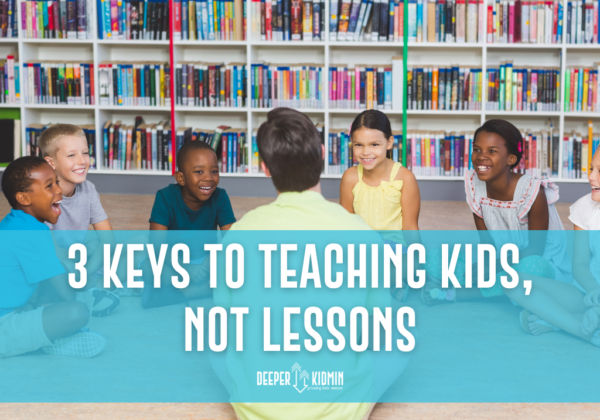
What would you say is the most important aspect of your lesson each week? The “hook”? The gamification elements? The life application?
Plot twist! One of the most important aspects of your lesson doesn’t even have to do with the lesson itself. It’s actually the KIDS you are teaching and how well you know them! Effective and creative Bible teachers place as much value on knowing the children they teach as on the content of the lesson.
Yes, solid content and preparation are important, but if you’re not taking a few characteristics about the kids you teach into account, your effectiveness drastically decreases.
So here are 3 keys to teaching kids, not just lessons.
- Know your kids relationally. Kids learn best from people they know and love. Build relationships with your kids – both inside and outside of Sunday mornings – to increase your effectiveness. One easy way to do this? Learn kids’ names as quickly as possible and invite kids to ask questions in your ministry! Know what your kids are into and what they enjoy doing. Be OK with times of fellowship and fun in your ministry that allow for connections and relationships to form. You could even use this simple All About Me Ministry Printable for Kids that invites kids to share about themselves!
- Know your kids developmentally. Children’s ministry often spans a large age range, from birth to 5th grade, and there’s a lot that happens developmentally in a child’s life during those formative years. Do you (and your volunteer team) know the key developmental characteristics of the age group they serve? Check out LifeWay’s Levels of Biblical Learning or Orange’s Phase resources for more details, and DKM Subscribers have access to this developmental stages cheat sheet to help everyone remember important details about the age group they lead.
- Know your kids intellectually. That means knowing how they learn best! Do you have visual learners in your group? Lots of social learners? What about kids who need to process things quietly? We tend to teach the way we prefer to learn, so be aware of your own learning style so you can ensure a balance of teaching methods in your ministry. If we treat all learners the same, we invite boredom-induced chaos. Allowing children to interact with the day’s lesson in a variety of ways will help ensure you give each type of learner the opportunity to shine. One of my favorite ways to do this is through stations. P.S. This digital volunteer/teacher training focuses on learning styles and helping equip your team to engage every child!
You could almost say teaching children is like a game of darts. So by building relationships, teaching children at their developmental stages, and engaging them through various learning styles, you can more effectively become the link between a child and the Biblical content of your weekly lesson.

One Comment
Thanks Brittany!! I will share this with my team at our training this weekend!! Great stuff as always!!